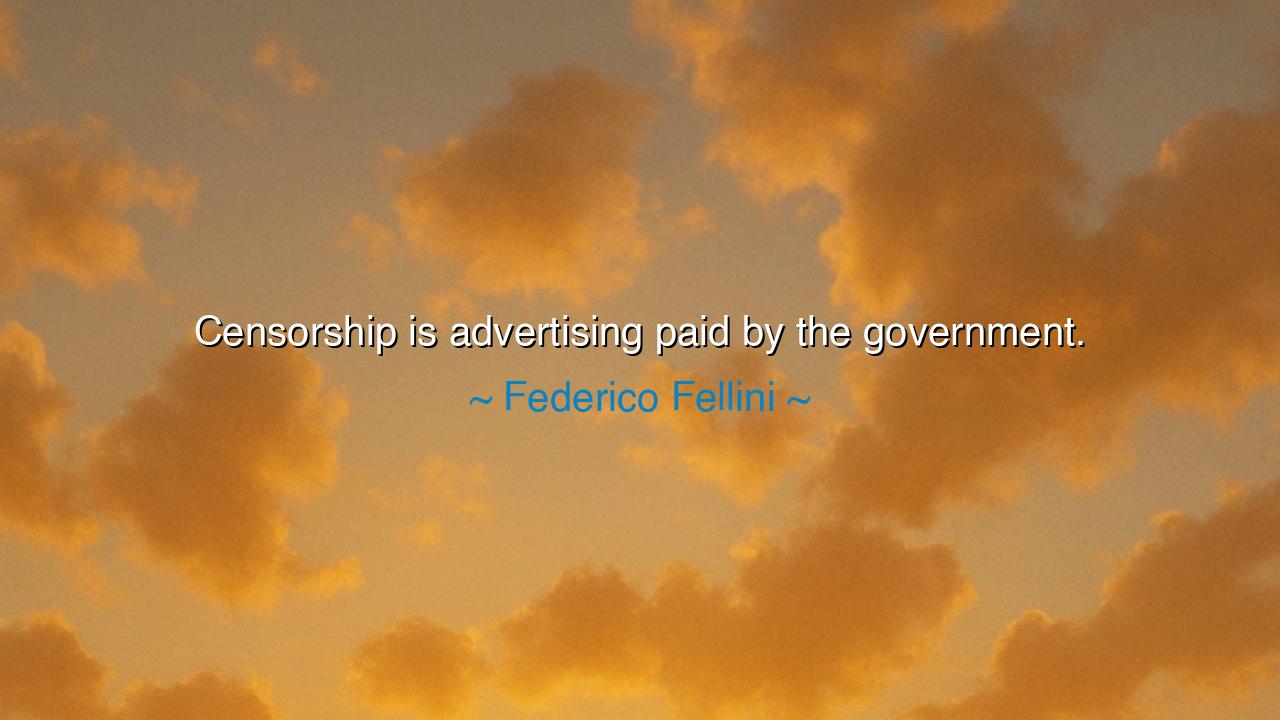
Censorship is advertising paid by the government.






The words of Federico Fellini, the legendary Italian filmmaker, cut through the fabric of illusion with the precision of a master artist: “Censorship is advertising paid by the government.” In this single sentence, Fellini exposes a truth that rulers and regimes have feared for centuries—that suppression does not silence ideas, it magnifies them. Censorship, far from erasing thought, transforms it into forbidden fruit, desired all the more because it is denied. And when that censorship comes from the state, it reveals something darker still: that the government itself becomes the patron of deceit, funding ignorance and disguising fear as virtue. Fellini’s insight is not merely about art or film—it is about the eternal struggle between truth and control, between the free mind and the hand that seeks to chain it.
To understand the origin of this quote, one must first understand the soul of the man who spoke it. Fellini lived and worked in postwar Italy, a nation scarred by fascism, where the wounds of Mussolini’s dictatorship had barely begun to heal. He had seen firsthand how propaganda masqueraded as culture, how art was twisted into an instrument of obedience. Under fascist rule, films and newspapers were censored to glorify the state and suppress dissent. But Fellini, who believed that art was the mirror of the human spirit, recognized the irony: each attempt to silence truth only drew more attention to it. The state could censor a scene, but not the curiosity it provoked. Thus, when he said that censorship is advertising, he meant that suppression is the most powerful form of promotion—the louder the silence, the greater the intrigue.
This paradox has been proven time and again throughout history. In the Soviet Union, books banned by the regime—like George Orwell’s Animal Farm and Boris Pasternak’s Doctor Zhivago—spread in secret, copied by hand, passed from friend to friend like relics of forbidden wisdom. The more the state condemned them, the more beloved they became. The government, in its zeal to control ideas, became the greatest publicist for rebellion. So it has always been: when authority tries to bury the truth, it only fertilizes it. Censorship cannot kill a thought—it merely drives it underground, where it gathers strength, waiting to burst forth in the light of freedom.
Fellini’s insight reaches beyond politics into the human soul itself. For censorship begins not only in governments, but in individuals—when fear and conformity silence the voice of conscience. The man who dares not speak his truth because he fears ridicule or rejection is already half enslaved. The artist who censors himself for approval has already betrayed his muse. Thus, the battle against censorship is not fought only in courts or parliaments, but within the heart of every free being. The courage to speak—to write, to create, to dissent—is the flame that keeps civilization alive. For truth, like fire, grows brighter when the wind of opposition blows against it.
Consider the story of Galileo Galilei, who stood before the Inquisition for daring to say that the Earth revolved around the Sun. The Church silenced him, forcing him to recant, but the very act of silencing him turned his discovery into legend. His truth outlived his accusers, spreading far beyond their reach. The censorship meant to destroy him immortalized him. The state sought to erase his words, but instead it engraved them into the memory of mankind. Fellini’s quote captures this eternal irony: when power seeks to hide truth, it ends up proclaiming it louder than any prophet could.
The deeper wisdom of this saying lies in its moral vision. Censorship is not merely a political act—it is an act of fear. Governments censor what they do not understand or cannot control. But truth requires no protection, only courage. A nation that silences its thinkers, its artists, its critics, is not strong—it is afraid of its own reflection. Fellini’s warning, therefore, is not just for governments, but for societies: beware the comfort of controlled narratives. Beware of the pleasant lie that shields you from the painful truth. For every time we allow censorship to prevail, we exchange our freedom for the illusion of safety—and the cost is always the death of imagination.
The lesson is as timeless as it is urgent: never trust silence when it is enforced. Seek the voices that are banned, the books that are burned, the art that is condemned—for there, more often than not, lies the pulse of truth. Speak even when it is dangerous, question even when it is forbidden, and defend the right of others to do the same. For every society that censors today will, in time, censor you tomorrow. To preserve liberty, we must keep the flame of speech burning, even when the night grows long.
And so, let Fellini’s wisdom endure across generations: the attempt to suppress truth is the loudest confession of fear. The government that censors proclaims its own insecurity; the artist who resists proclaims his immortality. Censorship is not the death of expression—it is its resurrection in the hearts of those who refuse to bow. For when the state funds silence, it advertises rebellion. When it forbids thought, it awakens thinkers. And when it seeks to bury truth, it only ensures that, one day, truth will rise again—radiant, unbroken, and eternal.






AAdministratorAdministrator
Welcome, honored guests. Please leave a comment, we will respond soon